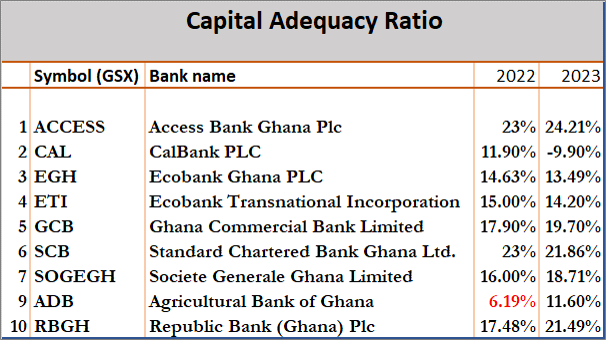Keeping a Watch on Regulatory Capital
Abdul Aliyoum Boukar, Accra, Ghana
February 27, 2024
C ontagion from international markets exposes Ghana's financial institutions to exogenous risks. It creates disruptions and difficulties for firms and financial markets. The Basel accord harmonizes international regulations for capital requirements. The capital adequacy ratio (CAR) is an indicator of the solvability of a bank. Its calculation takes several parameters into account including risk-weighted assets, limits and off-balance sheet exposures and in some cases even the portfolio of counterparties. The goal of the capital adequacy is to improve the safety and soundness of the financial system. It also seeks to protect depositors in case of crisis. The Bank of Ghana (BoG) requires banks to hold a regulatory capital based on risk-weighted assets.
Evolution: Basel I, II, III & ‟IV”
The appellation ‟Basel Accords” comes from successive banking regulations. ‟Basel Accords” are rules that help to maintain reserves and capital. These reserves help banks to absorb unexpected losses. The first Basel Accord became effective in 1988. It prescribed 8 percent of risk-weighted assets to banks as capital to meet their obligations. Basel II and III followed in 2004 and 2010. Developments in the global economy and innovations continue to usher in new rules1.
A recent example is the consultative paper on crypto-currencies by the Basel Committee. Another emerging example is the climate risk stress test by the European Central Bank (ECB). In the same vein, the US Federal Reserve announced new rules to reduce variability in risk-weighted assets in 2022. Financial analysts have dubbed the next generation of capital adequacy reforms, ‟Basel IV ” with full adoption expected by 2025.
Ghana has enlisted the support of the International Monetary Fund (IMF) to continue to keep pace with the evolution of the CAR rules. On February 15th, 2023, Leonard Chumo arrived in Ghana to assist the BoG in its drive for reforms. Chumo helped the bank to complete its transition to the Basel II/III framework. He also helped the Bank to start preparations for ‟Basel IV ” .
Since 2015, Mr. Chumo is the third IMF expert to assist BoG.
IMF Team and BoG Governor in Accra
2
Photo credit ©: Bank of Ghana 3
Reform
In 2017, the BoG announced a new capital rule as part of a holistic reform of the financial sector. The BoG tripled the minimum paid up capital for existing banks and new entrants. One goal of the reform was to ensure that banks continue to maintain a strong capital base.
In 2022, the BoG issued prudential rules for Development Finance Institution (DFI). The new guidelines prescribe new risk-based Capital Adequacy Ratio (CAR). The new CAR must be at least 10 percent.
| Timing | USD | Gh Cedi |
|---|---|---|
| Before 2017 | USD$10 million | GH₵120 million |
| From Sep. 11, 2017 | USD$34.7 million | GH₵400 million |
Externalities
External risks affect healthy banks and their counterparties. For these reasons and despite their importance, capital regulations rules must change. Specifically, banking regulators have to review CAR in period of economic turbulence or in cases of severe external shock. This was the case when Ghana launched a Domestic Debt Exchange Program, following a suspension of debt payment by the State. Losses from the DDE had a severe negative impact on banks' solvency, liquidity, and profitability.
As remedial measures, the BoG introduced regulatory relief to cushion the impact of the DDE. A crucial measure was a reduction of capital adequacy ratio from 13 percent to 10 percent as of 31st December 2022. In the computation of CAR, the relief package measure incorporated losses incurred from the DDE. The Government also announced the establishment of a Ghana Financial Stability Fund (GFSF). This fund will serve as a ‟liquidity backstop for banks and other financial institutions adversely affected by the domestic debt exchange”4.
However, this is a temporary measure. Banks have four years to restore the minimum paid-up capital.
Banks meet and exceed CAR
In the January 2023 monetary policy report, the Bank of Ghana, announced that the industry’s solvency position, measured by the Capital Adequacy Ratio (CAR) adjusted for regulatory reliefs, was 13.9 percent in December 2023. This was higher than the prescribed prudential minimum of 10 percent, but lower than the ratio of 16.2 percent recorded in December 2022. The BoG explained that the decline of the CAR between December 2022 and December 2023, reflected the recognition of the impairments from the Domestic Debt Restructuring Program in 2023.
At the end of Q1 2024, the banking regulator affirmed that the sector has rebounded. It highlighted another CAR rise of 13.6 percent in February 2024 due to an increasing capitalization by the banks. For the BoG, a parallel increae of total assets of the banks by 21.0 percent during the same period and also of deposits and advances (25.5 percent, and 1.8 percent, respectively) are strong signs of a recovery. Banks are meeting and even exceeding the CAR according to the Ghana Association of Banks (GAB). A survey of 22 banks in 2023 by the GAB shows that 19 banks out of 22, outperformed the prescribed benckmark5.
To 10 Banks: Capital adequacy ratio (2022-2023)

Source: BoG - Compilation: www.neweconomyghana.com
On May 30th, 2024, the World Bank approved a US$250 million five-year project for Ghana’s Financial Sector Strengthening Strategy (FSSS). The project will contribute to the recapitalization of viable banks and specialized deposit-taking institutions (SDIs) impacted by Ghana’s Domestic Debt Exchange Program (DDEP)6.
Related Articles
BIBLIOGRAPHY
1❩ of Ghana Cedi 400 million in 2021 (400 million in 2021)
2❩ BoG welcomes Mr. Leonard Chumo, IMF expert in financial sector supervision who at the Bank’s request; will help complete its transition to the Basel II/III framework. Mr. Chumo is the third IMF expert since 2015 to assist BoG.
3❩ https://twitter.com/thebankofghana/status/1625909615887101978/photo/1
4❩ Bank of Ghana Monetary Policy, March 2023.
5❩ Ghana Association of Banks (2023): Banking Industry Bounces Back Strongly In 2023. - https://gab.com.gh/researchpub/2023/05/09/banking-industry-bounces-back-strongly-in-2023/
6❩ World Bank (2024): World Bank Supports Ghana to Strengthen its Financial Sector. - https://www.worldbank.org/en/news/press-release/2024/05/31/world-bank-supports-ghana-to-strengthen-its-financial-sector
